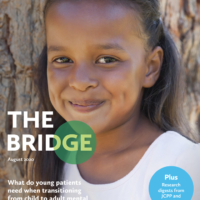Search results
-
Recommended
Sleep
Children and adolescents who are experiencing difficulties with their mental health also often struggle with their sleep. Indeed disrupted or altered sleep has been associated with most psychiatric disorders (Gregory & Sadeh, 2016). Although a range of sleep difficulties can co-occur with mental health problems, a common difficulty is insomnia. As such this guidance will primarily focus on difficulties with getting to sleep and staying asleep.
Read more -

December 2020 – The Bridge
Welcome to the December 2020 issue of The Bridge. This year has been extremely challenging for our field, as we’ve needed to understand and address the impact of the coronavirus pandemic on young people’s mental health.
Read more -

Making personalised predictions of poor functioning following negative childhood experiences
Experiencing abuse, neglect, bullying, or domestic violence in childhood increases the likelihood of having poor functioning in young adulthood, but this is not the case for everyone. Being able to accurately predict which individuals are at high risk for poor outcomes following such negative childhood experiences could support professionals to effectively target interventions. Is it possible to make accurate personalised predictions?
Read more -

November 2020
The research featured in this issue covers a wide range of topics relevant to our work with young people, including neurodevelopmental, emotional, and behavioural disorders, their comorbidity, and their links with functioning and quality of life.
Read more -

November 2020 – The Bridge
The research featured in this issue covers a wide range of topics relevant to our work with young people, including neurodevelopmental, emotional, and behavioural disorders, their comorbidity, and their links with functioning and quality of life.
Read more -

Associate Professor Dr. Stephen P Becker
Stephen P Becker is Associate Professor of Pediatrics in the Division of Behavioral Medicine and Clinical Psychology at Cincinnati Children’s Hospital Medical Center and the Department of Pediatrics at the University of Cincinnati College of Medicine, Cincinnati, Ohio, USA. The overall objective of Stephen’s research is to better understand the developmental pathways of attention-deficit/hyperactivity disorder (ADHD), co-occurring psychopathologies, and functional impairments.
Read more -

‘The Brain, early development, and autism’ – In Conversation with Professor Emily Jones
Professor Emily Jones of the Centre for Brain and Cognitive Development at Birkbeck University of London talks neurodevelopment, attention training and intervention.
Read more -

World Mental Health Day 2020: Mental Health for all
The theme of this year’s World Mental Health Day is ‘mental health for all’. Our Vision is ‘Sharing best evidence, improving practice’, and to this end we urge you to take a look at the learning opportunities on our website and to share with your networks.
Read more -

Is brain circuitry linked with early symptoms of autism spectrum disorder?
Researchers in San Diego, USA, have studied the relationship between brain network connectivity and emerging autism spectrum disorder (ASD) symptoms in toddlers aged 17-45 months with (n=24) or without (n=23) ASD.
Read more -

‘Teens, Tics, and Tech’ – Camilla Babbage ‘In Conversation Tourettes Syndrome’
‘In Conversation Tourettes Syndrome’ kicks off with Camilla Babbage, PhD researcher in Applied Psychology at the University of Nottingham, giving an overview of the development an App for young people with tics, with the specific aim of improving wellbeing.
Read more -

August 2020 – The Bridge
This month there has been a renewed focus on the impact of institutional care on children’s development and mental health, following publication of the Lancet Group Commission on this subject.
Read more
